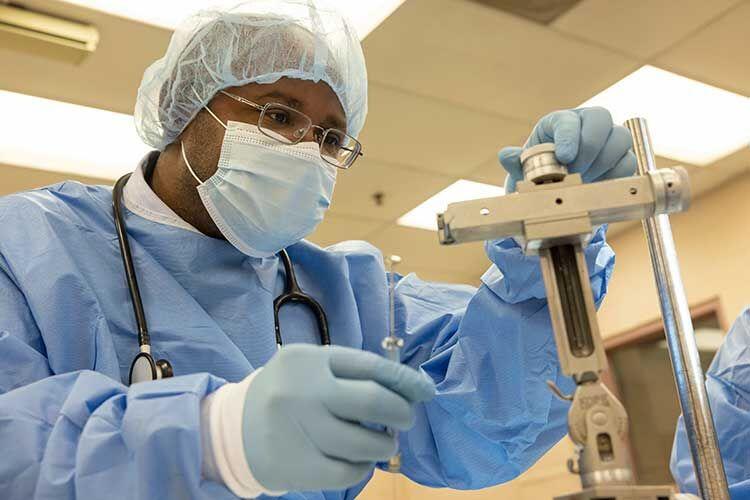ATHENS — A new combination therapy developed at the University of Georgia’s Regenerative Bioscience Center has shown promising results in models of ischemic stroke, or strokes caused by blood clots, significantly reducing disability within a three-month period.
Building on more than a decade of work using pig models for stroke research and induced pluripotent stem cell-derived neural stem cells, Professor Franklin West and a research team including Jin Xie, a professor in the Department of Chemistry at UGA’s Franklin College of Arts and Sciences, have determined that adding drug-loaded nanoparticles containing the anti-inflammatory compound Tanishinone IIA (Tan IIA) to iNSCs significantly improves outcomes in ischemic stroke pig models.The study has been published in the journal Stem Cells Translational Medicine. Work on the study was supported by doctoral students Erin Kaiser, Elizabeth Waters and Xueyuan Yang.
×
Javascript is required for you to be able to read premium content. Please enable it in your browser settings.
kAm“p7E6C J@FC 3C2:? 92D 2 DEC@<6[ >2?J 46==D 5:6 2?5 E96C6 :D 2? @G6C2== 564C62D6 :? A6C7@C>2?46 :? E96 46==D E92E DFCG:G6[” (6DE D2:5] “%96C6 :D 2=D@ 2 564C62D6 :? E96 H2J E96 3=@@5 7=@HD 2C@F?5 E96 3C2:?[ 42==65 A6C7FD:@?] qFE H:E9 E96 DE6> 46== EC62E>6?E[ E9:D :>AC@G65] %96 AC@3=6> H2D[ H96? J@F EC2?DA=2?E E96 46==D[ E96J 2C6 36:?8 :?EC@5F465 :?E@ 2? 6?G:C@?>6?E E92E’D C62==J 4JE@E@I:4 2?5 :E =625D E@ 9:896C =6G6=D @7 46== 562E9]”k^Am
kAm~7 2AAC@I:>2E6=J `_ >:==:@? :}$rD EC2?DA=2?E65[ =6DD E92? `_T @7 E96 46==D DFCG:G6 E@ 56G6=@A :?E@ @E96C EJA6D @7 3C2:? 46==D[ 96 25565]k^Am
kAm“(96? E96C6 :D 2 3C2:? :?;FCJ[ 2== E96D6 H9:E6 3=@@5 46==D 2C6 CFD9:?8 E@ E96 D:E6 @7 :?;FCJ E@ ECJ E@ C6A2:C E96 52>286 2?5 E96J AC@5F46 H92E H6 42== :?7=2>>2E@CJ 4JE@<:?6D[” (6DE D2:5] “%9@D6 4JE@<:?6D AC@>@E6 46== 562E9[ D@ H96? H6 AFE E96D6 ?6FC2= 46==D :?[ E96C6 :D 2== E9:D 46== D:8?2=:?8 E@ E6== E9@D6 46==D E@ 5:6]”k^Am
kAmp55:?8 E96 %p} xx\p ?2?@A2CE:4=6D :D >62?E E@ 255C6DD E92E :?E6?D6 4JE@<:?6 C6DA@?D6[ H9:49 42FD6D 46==D E@ CFAEFC6[ C6=62D:?8 7C66 C25:42=D :?E@ E96 3C2:?[ (6DE D2:5[ =:<6?:?8 E96 5F>A @7 7C66 C25:42=D :?E@ E96 3@5J 27E6C 2 DEC@<6 E@ 2 ?F4=62C C624E@C >6=E:?8 5@H?]k^Am
kAm“%96 >:E@49@?5C:2 @7 J@FC 46==[ E9@F89 :E :D E96 A@H6C9@FD6 @7 E96 46==[ 86?6C2E6D 2 =@E @7 7C66 C25:42=D[ 3FE :E’D :? 2 4@?EC@==65 6?G:C@?>6?E[” 96 D2:5] “xE’D <:?5 @7 =:<6 2 ?F4=62C C624E@C — :E’D 8C62E H96? E96 6?6C8J :D :? E96 C624E@C[ 3FE :7 :E 6IA=@56D[ J@F’C6 :? EC@F3=6] %96J ;FDE DA:== E@I:4 H2DE6 2== @G6C E96 A=246]”k^Am
kAm(6DE H@C<65 H:E9 y:? ):6[ 2 AC@76DD@C @7 496>:DECJ :? E96 uC2?<=:? r@==686 @7 pCED 2?5 $4:6?46D[ E@ 56G6=@A ?2?@A2CE:4=6D 4@?E2:?:?8 %p}\xxp[ 2? 2?E:\:?7=2>>2E@CJ[ 2?E:\@I:52E:G6 4@>A@F?5 56C:G65 7C@> E96 C@@E @7 $2=G:2 >:=E:@CC9:K2[ 2=D@ <?@H? 2D 52?D96?[ H9:49 :D FD65 :? EC25:E:@?2= pD:2? >65:4:?6 2?5 92D 366? H:56=J DEF5:65 7@C FD6 :? E96 EC62E>6?E @7 2 G2C:6EJ @7 5:D62D6D]k^Am
kAm(9:=6 E96 4@>A@F?5 H2D EC25:E:@?2==J FD65 2D 2 E62 56C:G65 7C@> 52?D96? C@@E[ (6DE 2?5 ):6 FD65 2 >@C6 4@?46?EC2E65 7@C>]k^Am
kAm“(6 564:565 E@ AFE E9:D :? 2 ?2?@A2CE:4=6 2?5 :?;64E :E E@ 2==@H 7@C E96 3:@24E:G6 4@>A@?6?E @7 :E E@ 36 2G2:=23=6 E@ E96 3C2:? 7@C 6IE6?565 A6C:@5D @7 E:>6” E@ 8:G6 E96 4@>A@F?5 E96 @AA@CEF?:EJ E@ C65F46 E96 :?7=2>>2E:@? 2?5 7C66 C25:42=D AC6D6?E 2C@F?5 E96 D:E6 @7 E96 :?;FCJ[ (6DE 6IA=2:?65] qJ FD:?8 E96 ?2?@A2CE:4=6D[ E96 4@>A@F?5 D=@H=J C6=62D6D @G6C fa 9@FCD]k^Am
kAm%@ 6?42ADF=2E6 E96 5CF8[ ):6 FD65 !{vp[ @C A@=JW=24E:4\4@\8=J4@=:4 24:5X[ 2? usp\2AAC@G65 A@=J>6C 7@C 4=:?:42= 5CF8 56=:G6CJ]k^Am
kAm“%96 :562 H2D E@ FD6 2 ?2?@A2CE:4=6 E@ 6?42ADF=2E6 E96 5CF8 D@ H6 42? 4@?EC@= E96 C6=62D6 @7 E96 E96C2A6FE:4 @G6C E:>6[ @E96CH:D6 E96 5CF8 E6?5D E@ 92G6 2 D9@CE 4:C4F=2E:@? A6C:@5 2?5 :D 4=62C65 2H2J C2A:5=J[” ):6[ H9@D6 C6D62C49 92D 7@4FD65 @? ?2?@A2CE:4=6 5CF8 56=:G6CJ :? 42?46C EC62E>6?E[ D2:5]k^Am
kAmu@C E96 DEF5J[ aa DF3;64ED H6C6 C2?5@>=J 5:G:565 :?E@ E9C66 8C@FAD — @?6 EC62E65 H:E9 :}$rD 2=@?6[ E96 D64@?5 EC62E65 H:E9 E96 %p} xxp :?7FD65 ?2?@A2CE:4=6D A=FD :}$rD 2?5 2 4@?EC@= 8C@FA E92E C646:G65 ?@ E96C2A6FE:4 EC62E>6?E]k^Am
kAm~G6C E96 4@FCD6 @7 E96 `a\H66< DEF5J[ C6D62C496CD FD65 >28?6E:4 C6D@?2?46 :>28:?8 W|#xX[ 2 |@5:7:65 #2?<:? $42=6 ?6FC@=@8:42= 6G2=F2E:@?[ 2?5 =23 E6DED E@ 56E6C>:?6 H96E96C E96 :?;64E65 :}$rD H6C6 56G6=@A:?8 :?E@ ?6FC@?D]k^Am
kAm“v:G:?8 E96 ?2?@A2CE:4=6D[ E96? EC2?DA=2?E:?8 E96 DE6> 46==D[ H6 H6C6 9@A67F==J 8@:?8 E@ :>AC@G6 @FE4@>6D] p?5 H96? H6 5:5 E92E[ :E 5@F3=65 E96 ?F>36C @7 DE6> 46==D E92E :?E68C2E65 :?E@ E96 E:DDF6[” (6DE D2:5]k^Am
kAmtDD6?E:2==J[ E96 %p} xxp ?2?@A2CE:4=6D C65F465 E96 DEC@<6 52>2865 3C2:? E@I:4:EJ E@ 6?23=6 36EE6C :}$r DFCG:G2= 2?5 6?8C27E>6?E] qJ C65F4:?8 E96 :?7=2>>2E@CJ C6DA@?D6 :? E96 3C2:?[ E96 EC62E>6?E 2=D@ C65F46D E96 D42CC:?8 E92E 42? :?9:3:E ?2EFC2= 3C2:? C64@G6CJ] %96 :}$rD E96? 56G6=@A :?E@ ?6FC@?D[ C6A=24:?8 52>2865 46==D :? E96 C68:@? 2C@F?5 E96 4@C6 :?;FCJ]k^Am
kAm#6DF=ED 2E `a H66<D A@DE\EC62E>6?E D9@H65 E92E 25>:?:DEC2E:@? @7 %p} xxp ?2?@A2CE:4=6D :?4C62D65 :}$r 6?8C27E>6?E A@DE\DEC@<6[ AC@>@E65 C6A=246>6?E @7 52>2865 E:DDF6 A@DE\DEC@<6 2?5 C65F465 E96 ?F>36C @7 <:==6C :>>F?6 46==D E92E D:8?2= 46==D E@ 5:6]k^Am
kAmx? 255:E:@?[ E96 A:8D H9@ C646:G65 E96 %p} xxpZ:}$rD EC62E>6?E 564C62D65 =6D:@? G@=F>6D :? E96 52>2865 2C62D @7 E96 3C2:?[ C65F465 :?EC246C63C2= 3=665:?8 2?5 C65F465 >:5=:?6 D9:7E[ H9:49 :D E96 5:DA=246>6?E @7 3C2:? E:DDF6 24C@DD E96 ?2EFC2= 46?E6C =:?6 @7 E96 3C2:? 27E6C :?;FCJ 5F6 E@ :?EC24C2?:2= AC6DDFC6 7C@> DH6==:?8 2?5 2 3F:=5FA @7 7=F:5D]k^Am
kAm“(6 42? :>AC@G6 6?8C27E>6?E 3J FD:?8 ?2?@A2CE:4=6D[ 2?5 :E’D ?@E ;FDE 8@:?8 E@ 36 2 D>2== 3F>A] xE’D DFA6C492C8:?8 E96 6G6?E[” (6DE D2:5]k^Am
kAmx? 255:E:@? E@ E96 :>AC@G65 3C2:? 4@?5:E:@?D H:E9 %p} xxpZ:}$rD EC62E>6?E[ A:8D C646:G:?8 E96 4@>3:?2E:@? D9@H65 D:8?:7:42?E=J C65F465 |@5:7:65 #2?<:? $42=6 D4@C6D 2?5 2 D:8?:7:42?E :>AC@G6>6?E :? 7F?4E:@?2= C64@G6CJ H:E9:? EH@ 52JD @7 C646:G:?8 EC62E>6?E[ E@ :?4=F56 H2=<:?8 :?56A6?56?E=J 2?5 62E:?8 2?5 5C:?<:?8 H:E9 2DD:DE2?46[ 4@>A2C65 E@ A:8D E92E C646:G65 ?@ EC62E>6?E]k^Am
kAm“(6’C6 FD:?8 2 9F>2? D42=6 H96C6 K6C@ >62?D E96C6 2C6 ?@ DJ>AE@>D — J@F’C6 4@>A=6E6=J ?@C>2= — 2?5 D:I >62?D J@F’C6 5625] xE’D 2 AC6EEJ 4=62C >6EC:4[” (6DE D2:5]k^Am
kAm!C6\DEC@<6[ 2== @7 E96 DF3;64ED H6C6 2E 2 >#$ D4@C6 @7 K6C@] p7E6CH2C5[ 2== @7 E96 E6DE DF3;64ED C68:DE6C65 2E 2? 2G6C286 @7 7:G6 @? E96 D42=6] pE `a\H66<D A@DE AC@465FC6[ E96 DF3;64ED C646:G:?8 ?@ EC62E>6?E D9@H65 G6CJ =:EE=6 AC@8C6DD A2DE 2 E9C66 @? E96 D42=6] $F3;64ED C646:G:?8 @?=J E96 :}$rD EC62E>6?E :>AC@G65 E@ 36EH66? 2 EH@ E@ 2 E9C66 @? E96 D42=6[ H:E9 EH@ :?5:42E:?8 D=:89E 5:D23:=:EJ]k^Am
kAmu@C DF3;64ED C646:G:?8 E96 %p} xxpZ:}$rD EC62E>6?E[ DF3;64ED D4@C65 36EH66? 2 @?6 2?5 2 EH@ @? E96 D42=6[ H9:49 :?5:42E6D 2 C2?86 7C@> ?@ D:8?:7:42?E 5:D23:=:EJ E@ D=:89E 5:D23:=:EJ]k^Am
kAm“x? 9F>2?D[ @?46 J@F 9:E E92E E9C66\>@?E9 E:>6 A@:?E[ H92E6G6C :>AC@G6>6?ED E92E 2C6 8@:?8 E@ @44FC 2C6 AC@323=J 8@:?8 E@ 36 :?4C6>6?E2= :>AC@G6>6?ED[” (6DE D2:5] “%9:D :D <:?5 @7 =:<6 E96 8@=56? H:?5@H — J@F ECJ E@ 249:6G6 2D >F49 :>AC@G6>6?E 2D A@DD:3=6 3642FD6 :E :D 2D 8@@5 2D :E’D 8@:?8 E@ 86E 27E6C E92E H:?5@H]k^Am
kAm“pE E96 D6G6C:EJ =6G6= @7 DEC@<6 A2E:6?ED E92E H6 2C6 5:D4FDD:?8[ 23@FE e_T >FDE 92G6 D@>6 :?\9@>6 42C6[ >62?:?8 2 ?FCD6 4@>6D E@ E96:C 9@FD6 2?5 92D E@ 7665 E96> 2?5 96=A E96> 5C6DD] x7 J@F 4@F=5 :>AC@G6 E92E E@ 36:?8 D=:89E=J 5:D23=65 FA E@ 92G:?8 ?@ D:8?:7:42?E 5:D23:=:EJ[ E92E’D 2 82>6 492?86C]”k^Am
kAm(6DE D2:5 96 :D 6286C E@ 25G2?46 E96 C6D62C49 E@ 9F>2? 4=:?:42= EC:2=D 2?5 :D 9@A:?8 E@ A2CE?6C H:E9 2 3:@>65:42= 4@>A2?J AFCDF:?8 DEC@<6 E96C2A6FE:4D E@ AFD9 E96 H@C< 7@CH2C5]k^Am
kAm“(6 2C6 2=D@ AFD9:?8 E9:D 7@CH2C5 :? D@>6 @E96C 2C62D[ =:<6 EC2F>2E:4 3C2:? :?;FCJ[ 2D H6 4@F=5 A@E6?E:2==J 6IA64E D:>:=2C C6DF=ED[” 96 D2:5]k^Am

















